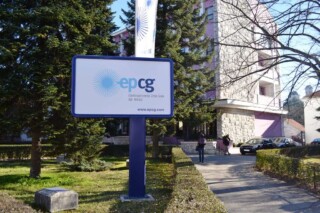Whenever there’s a lack of ammunition at the political stage, it [politics] reaches out to the national themes, and that’s an opportunity to give an alarm in the tribes and gather the parish. National topics are especially interesting ahead of the elections because through them people are homogenized and the ranks of voters become clearer. Therefore, the attitude towards the events in Montenegro can be perceived the same. However, we can follow continuity of the negative attitude beyond the elections, says Ms Vesna Mališić, a journalist, a deputy editor-in-chief of the Belgrade weekly NIN, known to the public for her tireless fight for the truth and as someone who does not have, as she says, articles that she would rather erase today. This is indeed a huge rarity in journalism.
-Extracts from the interview-
Are there any firefighters?
Ms Mališić: Yes, sometimes President Aleksandar Vučić is playing the role of a firefighter. He occasionally lets the arsonists light a fire, and then he appears as a rescuer. And suddenly he brings in a tone of dialogue, understanding and calm that he has previously suspended. Therefore, the Serbian political reality is taking place in constant waves of arson and appeasement. It is the technology of governing that the Serbian government has chosen – war in the political life of Serbia, but, unfortunately, with the region as well.
You are not the only one who compares the current situation with the one in the 1990s…
Ms Mališić: I remember those events very well.
…
Serbia has serious problems with democracy, with its political life and internal dialogue, with Kosovo, as well as the region. And it’s likely that it’s going to face serious problems with the heated nationalism that it’s now trying to boost in order to homogenize support.
What do you think about the events in Montenegro, that is, tensions sparkled by priests of the SPC and pro-Serbian parties backed by Belgrade following the adoption of the religious freedom law?
Ms Mališić: The issue referring to church and property should not be a matter of politics. If you mix them, you’re doing the instrumentalization of a religious thing for the benefit of some political option. That is why the dialogue between representatives of the govt and the Metropolitanate of Montenegro and the Littoral should be continued and constantly encouraged. Everything else would be wrong.
…
What’s Serbia doing is not good. We all had a chance to see leaders of pro-Serbian parties from Montenegro coming to Belgrade by planes of the government of Serbia in the times when litanies were organized and times of other political conflicts in Montenegro. I don’t say Serbia should not take care of its national corpus, on the contrary, but there are too many manipulations.
Frustration over Montenegrin independence doesn’t seem to pass…
Ms Mališić: Frustration of a large part of the Serbian public over Montenegrin independence is still greatly visible. Serbia experiences it as if something had been taken from her. I think Serbia is the only country in the world that was not glad to be on its own. Its citizens felt like losers. I have already written about that frustration, asking myself what politician has the right to arouse its nation the feeling of loss, depression, and abandonment. That’s a great frustration that Mr Koštunica led to, as he was the one who told the Serbian state – no one wants you, everybody is running away from you, you are left on your own. It’s unforgivable!
Serbian media, politicians, historians… They all focus on President Milo Đukanović. Things we’ve had a chance to read, hear and see really represent brutal media campaign… Why?
Ms Mališić: I don’t know what any president of another country, whatever he is, would be an obsessive topic for the Serbian public and politicians. However, Mr Đukanović is an obstacle to those who are convinced that Montenegro will say goodbye to NATO, EU integration, and that it will return to its “natural environment”, that is, the union with Serbia. And they don’t even try to hide it anymore. Mr Đukanović is perceived as the greatest obstacle, not his party, but he himself. And there are many people in Serbia who think alike.
You were facing serious problems recently; you were the target of the media as you said that Mr Đukanović was a skillful politician and would know how to solve the problem when it comes to litanies organized across Montenegro…
Ms Mališić: The question was whether and how Mr Đukanović was going to solve the problem of litanies. I said that he probably would, as he was a skillful and an experienced politician. I also told that drawing tricolors in Montenegro was a protest and a kind of provocation, because we put everything in the context of the growing conflicts in Montenegro. Of course, the game of hiding around the tricolor and whether it was a Serbian flag or the flag of King Nikola was clear. And, of course, Serbs would also consider it as a provocation if Croats in Vojvodina started drawing the Croatian flag everywhere. It was the trigger for a horrific attack on me. Here, by the way, an intensive social bots platform receives instructions on whom to crucify.
On the suppression of the coronavirus outbreak
We see that Serbia uses the coronavirus pandemic to belittle Montenegro and the results it achieved. Is it also an example of frustration?
Ms Mališić: I sincerely hope that borders will be opened soon without mandatory quarantine, and that I’ll be able to go on holiday in Herceg Novi, which is, by the way, the town that best denies stories about the alleged unfavorable position of Serbs. It’s a pro-Serbian town with pro-Serbian parties in power.
As for the coronavirus, things are clear – figures say the best. If Serbia has 67 active cases per 100.000 people, and Montenegro set a criterion that a country needs to have 25 infections, than we have to reach the goal as soon as possible. Therefore, we have to tell about our problem and not point our finger to Montenegro, literally accusing it for our infections. On the other hand, President Vučić desires to be described as a rescuer in this whole story – the man who saved Serbs from Covid-19!




